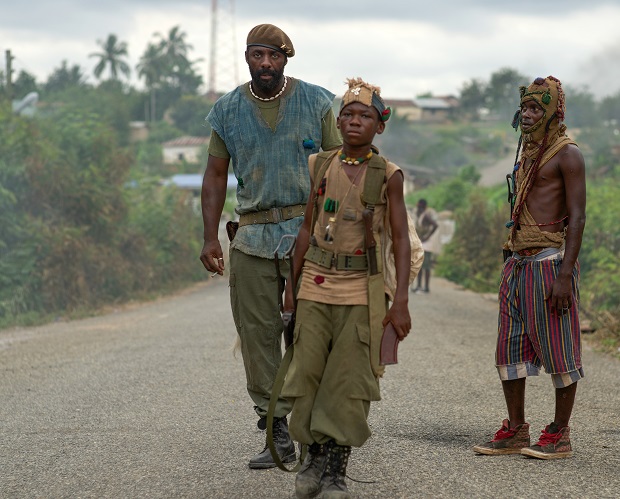
This photo provided by Netflix shows Idris Elba, left, as Commandant, and Abraham Attah, center, as Agu, in the Netflix original film, “Beasts of No Nation,” directed by Cary Fukunaga. AP
VENICE, Italy—Officially its full title is the International Exhibition of the Cinematographic Arts.
Yet the top prize at this year’s edition of the Venice Film Festival could be handed to a film destined to barely see the inside of a cinema but which will be available to watch on laptops, tablets and mobile phones from the moment it is released on October 16.
“Beasts of No Nation,” Cary Fukunaga’s child soldier drama, is the first Netflix feature film to be included in competition for a major film prize.
And regardless of whether or not it wins, the fact that a video-on-demand service has been able to place its content at the heart of the world’s oldest film festival is being seen as something of a landmark moment for an industry on the cusp of far-reaching change in the way its output is consumed.
Festival Director Alberto Barbera said he had not hesitated about including “Beasts” in the 21-strong selection of films competing for the Golden Lion. Streaming-based distribution services are becoming important sources of finance for filmmaking and “we can’t ignore them,” he argues.
Cinema owners are less open-minded with many refusing to provide slots for films simultaneously released to Internet subscribers on the grounds that this will kill the culture of going out to see films on a big screen—and sooner or later put them out of business.
In the case of a film like “Beasts,” the issue is arguably moot since the challenging nature of the film means it was only ever likely to get a limited, art-house cinema run.
But it is a question that can only become more acute as the volume and range of original production from online distributors expands.
Crouching Tiger, Spike Lee
Netflix has already signed Adam Sandler up to make four films for them and the company has funded the “Crouching Tiger, Hidden Dragon” sequel “The Green Legend”—now due to be released early next year, possibly with an eye on Netflix’s planned expansion in Asia.
Meanwhile, Amazon Prime have commissioned Spike Lee to make their first Oscar-eligible feature, a musical comedy about gun crime in Chicago called “Chiraq.” Lee once described the idea of watching a film on a mobile phone as “heartbreaking.”
Fukunaga spent more than a decade developing his project to make a film about child soldiers, an issue he first became interested in when studying neo-colonialism as an undergraduate.
He says Netflix’s offer to buy the film had been “in the Godfather way, an offer we couldn’t refuse.”
“Of course, I still want people to see it in the cinema but more than anything I want as many people as possible to see the movie.”
The chances of that happening, he argues, are far greater with access to Netflix’s 65-million strong subscriber base as a back-up to a cinema release that could easily end with the film just disappearing.
“It wasn’t a no-brainer, I wouldn’t say that, but it was undeniably powerful,” he told AFP. “And ultimately it comes down to consumer choice—if audiences want to see drama in the cinema, they have to show up.”
Machete Killing
Set in an unidentified West African country and shot in 22 different locations in Ghana, “Beasts” unflinchingly recounts the story of Agu, a happy-go-lucky boy whose joyous existence as part of a loving family is turned on its head after his village in a UN-protected buffer zone is overrun by government troops seeking to quell a rebellion.
His mother and sister are dispatched to a nearby city but Agu, played by newcomer Abraham Attah, is left behind to witness the killing of his brother and father.
He narrowly escapes with his life only to be captured in the bush by a group of rebels under the leadership of Commandant, a charismatic figure played by Idris Elba.
Taken under Commandant’s wing, what remains of Agu’s innocence is soon stripped away by the brutality of his daily existence, his initiation into the youthful battalion completed when he obeys an order to hack a university student to death with repeated machete blows to his head.
Such scenes make Fukunaga’s piece a testing view. But the film has been well-received and he has won praise for raising an issue he has wanted to dramatize for over a decade.
“The violence depicted in the film is nowhere near as violent as in real life,” he said. “Real war is gruesome.”